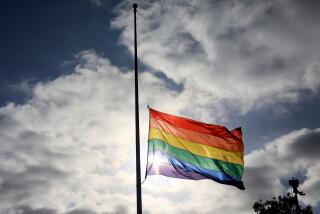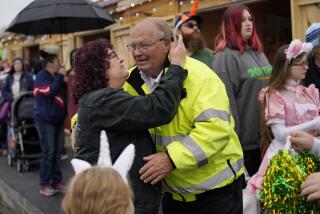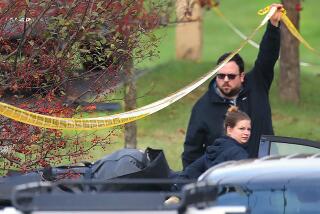No Answers, Only Funerals for Hate Victims
- Share via
EVANSTON, Ill. — They didn’t come for answers. There were none--none good enough to explain why Ricky Byrdsong was lying in a bronze coffin.
They came to the church to mourn a man who, during his 47 years of life, almost literally could not stop smiling. And they came, it seemed, just to make sure the world had not gone nuts.
“I just keep thinking, we’ve got to be better than this,” said mourner Susan Finerty. “I keep thinking, this can’t be who we are. It just can’t be. This is crazy.”
Five days after Byrdsong was shot as he jogged with his children and after six Orthodox Jews were wounded during the first hours of a three-day outburst of violence by a white supremacist, people here took their first steps Wednesday toward healing.
They did it by mourning Byrdsong, a man the vast majority of those at the First Presbyterian Church of Evanston had never heard of until he was gunned down for the sole reason, police believe, that he was black.
“I’d never met him,” said Christina Saenz, who sat on the grass outside the packed church. “But that doesn’t matter.”
They arrived by the carload and vanload, on bike and on foot, about 3,000 of them over the course of the day--twice the number the church could accommodate.
A professor from Madison, Wis., chartered a bus to bring mourners. A group of Orthodox Jews did the same. A Korean woman came in her bare feet, nodded as she passed by the open coffin and left without saying a word.
Byrdsong was a basketball coach most of his life and led the Northwestern University Wildcats for four seasons in the mid-1990s. Many of his former players could be seen Wednesday in the crowd, hunching over and sobbing.
They weren’t crying because the world had lost a great coach; Byrdsong won just 10 of 72 Big 10 games while at Northwestern. They were crying, everyone agreed, because the world had lost a great man.
“Forget the court. Forget the playing field. [He was] an impact player in life,” said Patrick G. Ryan, head of the Aon Corp., where Byrdsong developed programs for underprivileged children and gave motivational speeches.
And they were crying because, if Ricky Byrdsong could be shot in the back while jogging three blocks from his house, the world seemed in a very bad way.
The best comfort his old friend Pastor Haman Cross Jr. could offer was that Byrdsong himself would never be so pessimistic.
“The coach would say, ‘It’s bad, but it’s not that bad,’ ” Cross said. “The coach would say . . . , ‘The game is not over. It’s not over yet.’ ”
As mourners clapped and danced here--trying to celebrate Byrdsong’s life, only to break back into tears--hundreds more gathered in Bloomington, Ind., to mourn Won-Joon Yoon. The 26-year-old doctoral student from South Korea was slain in the Fourth of July weekend rampage as he stood with friends outside his church.
Yoon, who had been studying in Illinois and was to begin school in Indiana this year, wanted to spend the summer at home in Seoul before starting his doctoral program in economics. But his father, Shin-Ho Yoon, told him he should stay in the United States, learn his way around Bloomington.
“What is America . . . doing while the American flag--which is a symbol of freedom, equality and justice--is being torn apart by the gun spree?” Yoon’s father said Tuesday.
Yoon will be cremated Saturday, his parents said, and they will fly with his ashes back to Seoul.
Both Byrdsong and Yoon were killed by Benjamin Nathaniel Smith, a 21-year-old avowed racist who also wounded nine in Illinois and Indiana.
On Wednesday, ABC’s “Good Morning America” aired a video taken of Smith three weeks before the rampage in which he says a race war is inevitable.
Made by a student filmmaker working on a documentary about white supremacists in Illinois, the video shows Smith driving through the streets of Peoria, tossing pamphlets out his car window and lamenting the country’s “Jewish occupational government.”
“To want to live in a country where blacks have power over whites, where Jews are in control--that’s a sickness, and I’d like to eradicate that sickness,” Smith says in the video. “In some ways it’s inevitable--racial holy war.”
More to Read
Sign up for Essential California
The most important California stories and recommendations in your inbox every morning.
You may occasionally receive promotional content from the Los Angeles Times.













